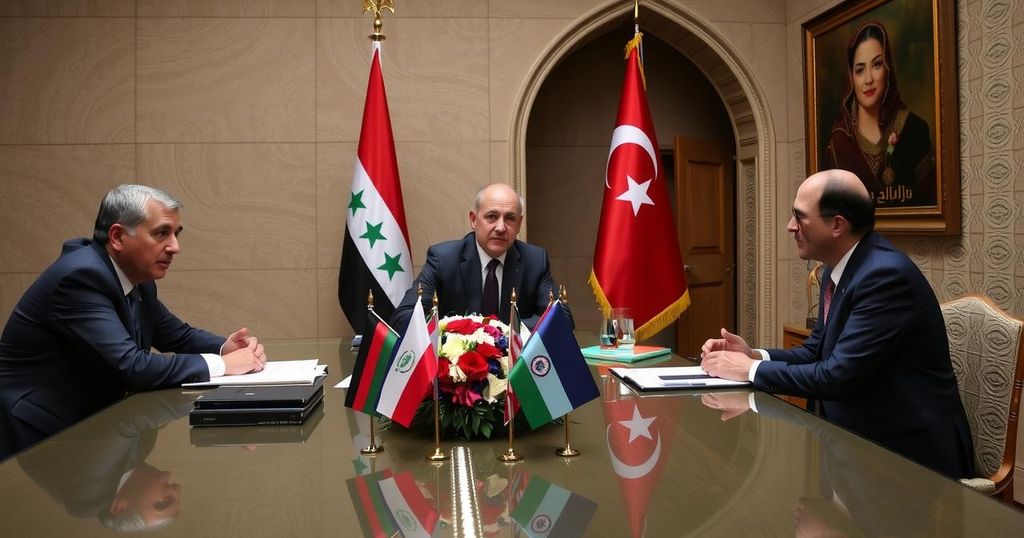Global Efforts to Engage Syria’s New Leaders Post-Assad Ouster
Following the ousting of President Bashar al-Assad by Islamist rebels, international engagement with Syria’s new interim government is increasing. The rapid takeover of Damascus has prompted celebrations among the populace, while governments scramble to adapt their policies. Key players, including Qatar and Turkey, are rekindling diplomatic ties, emphasizing support for the Syrian people. Diplomatic efforts aim to stabilize a nation scarred by over a decade of brutal civil strife.
In the wake of the surprising removal of President Bashar al-Assad by Islamist-led rebels, governments around the world are intensifying their outreach to the new interim authorities in Syria. This shift follows the fall of Damascus on December 8, which has resulted in widespread celebrations among the populace, who express feelings of liberation from Assad’s authoritarian regime. Yasmin Shehab, a student at Damascus University, remarked, “We feel liberated, and the chains have been broken. Fear has been shattered.”
The sudden nature of the ouster has left many nations reassessing their diplomatic strategies, as the commanding rebel faction, Hayat Tahrir Al Sham (HTS), retains a designation as a terrorist organization in the eyes of various Western countries. During discussions with UN envoy Geir Pedersen, HTS leaders were urged to form an inclusive government committed to justice and the principles of accountability.
A significant development is the arrival of a Qatari delegation, reaffirming Qatar’s long-standing support for the Syrian populace, particularly since it never reconciled with Assad’s rule. Meanwhile, Turkey has reinstated its diplomatic presence in Damascus, indicating its support for the new Islamist government following years of conflict.
Simultaneously, other nations like Britain and the United States have initiated communication with HTS to facilitate aid, while France is preparing to engage diplomatically with the newly established governing bodies. Ukrainian President Volodymyr Zelensky announced joint efforts to provide essential supplies, including food products.
Although the liberation of cities has prompted a cautious sense of optimism, remnants of wartime challenges remain. Reports from freed prisoners narrate harrowing accounts of torture under Assad, highlighting the need for vigilant recovery and rebuilding measures in the aftermath of systemic destruction. Interim officials recognize the daunting tasks that lie ahead as they attempt to reestablish the country’s institutional frameworks and stabilize the economy.
The political dynamics in Syria have undergone a seismic shift following the recent ousting of President Bashar al-Assad, a figure synonymous with two decades of oppressive governance and prolonged civil unrest. The removal of Assad has created a vacuum in leadership, prompting international actors to recalibrate their approaches toward Syria. As the interim government takes shape, concerns about its legitimacy and inclusivity have risen, especially given HTS’s extremist affiliations. The historical context of Syria’s civil war, which erupted in 2011 due to heavy-handed governmental repression against dissenting voices, is crucial in understanding the implications of the current power transition in Syria.
The recent overthrow of Bashar al-Assad marks a pivotal moment in Syria’s history, with new interim rulers urging a departure from decades of oppressive governance. The global community is adjusting its diplomatic ties and committing aid in light of this transformative political landscape. While relief permeates some sectors of the populace, significant challenges remain for rebuilding the shattered nation. Ongoing efforts will be essential to establish a stable foundation for the newly emerging administration and to safeguard the rights and well-being of all Syrian citizens.
Original Source: jordantimes.com




Post Comment